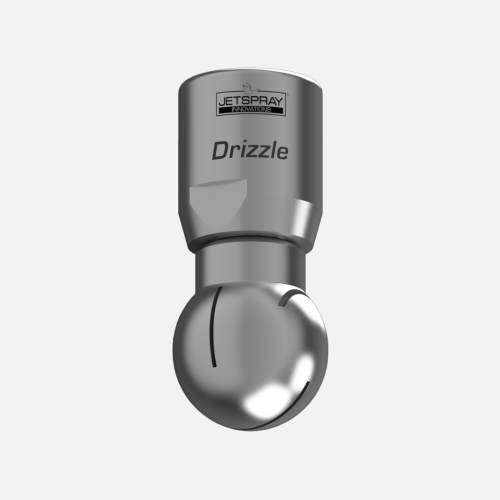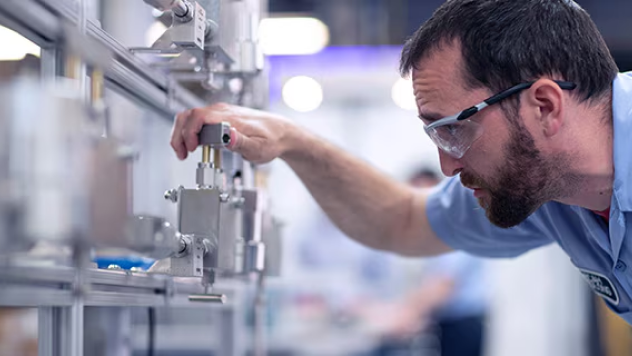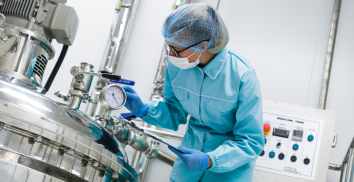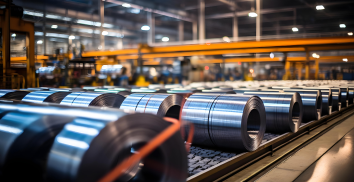Revolutionize Process Cleaning with Spray heads
Regulatory bodies enforce strict cleanliness standards in critical industry sectors such as pharmaceuticals


By Charles Pandian
Regulatory bodies enforce strict cleanliness standards in critical industry sectors such as pharmaceuticals, food, and beverages. Effective cleaning systems are essential for maintaining operational efficiency and ensuring compliance, from intricate machinery on production lines to large storage tanks.
Spray head technology, in particular, has emerged as a game-changer in process equipment cleaning. Read on to discover how these advanced systems provide a highly effective, efficient, and sustainable solution for cleaning large tanks and complex equipment, optimizing both performance and resource utilization.
The Role of Spray Head Technology in Process Equipment Cleaning
Spray head technology is widely used in industrial cleaning systems to ensure thorough, uniform equipment cleaning. By distributing cleaning liquids or solvents in a fine mist or spray pattern, spray heads clean surfaces effectively, removing all contaminants, residues, and buildup. Unlike traditional manual cleaning methods, automated spray heads provide consistency, reduce downtime, and enhance the overall efficiency of the cleaning process.
These systems are particularly effective in tank cleaning, CIP (clean-in-place) systems, and other high-demand environments where precision and reliability are paramount. The technology can be customized to meet the specific needs of various industries, offering high pressure, adjustable flow rates, and efficient use of cleaning agents.
Why Spray Head Technology is Crucial for Industries
Improved Cleaning Efficiency
One of the most significant benefits of spray head technology is its ability to provide uniform coverage and efficient cleaning. The spray nozzles ensure that cleaning solutions are evenly distributed across equipment surfaces, which is particularly important for large tanks and intricate machinery. This leads to a more consistent cleaning, minimizing the risk of contamination and enhancing product quality.

Minimizing Water and Chemical Usage
With growing demands for sustainability and resource conservation, industries focus on reducing waste. Spray heads are designed to optimize the use of water and cleaning agents, ensuring that only the necessary amount of fluid is used. This reduces water wastage and the amount of chemicals required, contributing to more environmentally friendly cleaning processes. The precision of modern spray heads means that cleaning agents are applied precisely where needed, reducing excess consumption.
Time and Cost Savings
Automated spray head systems can drastically reduce cleaning time compared to manual cleaning methods. This is especially valuable for industries operating on tight schedules and needing to minimize downtime. As cleaning cycles are faster and more efficient, the equipment can return to the entire operation sooner, directly impacting productivity. Additionally, by reducing the need for manual labour, spray heads lower operational costs, contributing to a more cost-effective cleaning process.
Consistency and Compliance
In regulated industries such as pharmaceuticals, cleaning procedures are about hygiene and compliance with strict industry standards. Spray head systems provide a reliable and consistent cleaning process that ensures every piece of equipment is thoroughly cleaned according to regulatory guidelines. The uniformity of cleaning cycles helps industries maintain compliance with standards such as GMP (Good Manufacturing Practices) in pharmaceuticals or HACCP (Hazard Analysis and Critical Control Points) in food production.

Adaptability to Various Applications
Spray head technology is incredibly versatile, offering adaptable solutions for a wide range of industrial applications. Whether it’s cleaning large tanks, reactors, pipelines, or small parts in a CIP system, spray heads can be customized to meet specific needs. They can handle different pressures, temperatures, and cleaning agents, making them suitable for various industries, from pharmaceuticals to chemicals to food processing.
Types of Spray Heads for Process Equipment Cleaning
- Static Spray Balls: Static spray balls are often used for smaller tanks or equipment with moderate cleaning requirements. These spray heads feature no moving parts, making them a low-maintenance solution. The fixed design ensures reliable performance with every cleaning cycle. Static spray balls are often chosen for their cost-effectiveness, reliability, and simplicity.
- Rotary Spray Balls: Rotary spray balls provide a more powerful cleaning action. These spray heads use the flow of cleaning liquid to rotate, creating a sweeping spray pattern that covers a larger area. They are ideal for larger tanks or more demanding cleaning applications that require high-pressure performance. Rotary spray balls ensure a thorough clean by creating a forceful rinse that reaches every surface.

- Retractable Spray Heads: Retractable spray heads are designed to remain flush with the equipment wall when not in use and pop out only during the cleaning cycle. This minimizes the risk of contamination and equipment wear, as they are not exposed to harsh chemicals or environments when not in operation. Retractable spray heads are ideal for industries where equipment cleanliness must be maintained without sacrificing functionality.
The Future of Spray Head Technology
As industries continue to prioritize sustainability, automation, and efficiency, the demand for advanced spray head technology will only increase. In the future, we can expect to see even more sophisticated spray heads that offer smart capabilities, such as remote monitoring and real-time adjustments for flow rates, pressure, and spray patterns. These innovations will further optimize cleaning cycles, reduce water and chemical consumption, and enhance the overall operational performance of process industries.
Conclusion
At Jetspray Innovations, we are committed to providing cutting-edge cleaning solutions with our advanced spray head technology. Whether you’re in the pharmaceutical, food and beverage, or chemical industries, Jetspray’s innovative spray heads are designed to meet your unique cleaning needs. We offer a wide range of customizable products, including static spray balls, rotary spray balls, and retractable spray heads, all crafted with the highest quality materials for durability and performance. With Jetspray, you can trust that your cleaning systems are in safe hands, delivering unmatched results with efficiency and reliability. Let us help you optimize your cleaning processes while ensuring compliance, reducing operational costs, and improving sustainability in your industry.
Discover the future of process equipment cleaning with Jetspray Innovations.
Frequently Asked Questions (FAQs)
1. What industries benefit from spray head technology?
Spray head technology is crucial across various industries that require stringent cleanliness standards, including pharmaceutical, food and beverage, chemical processing, cosmetics, and petrochemical industries. These sectors rely on spray heads for efficient cleaning and to meet regulatory compliance while maintaining optimal operational performance.
2. How does spray head technology improve cleaning efficiency?
Spray head systems enhance cleaning efficiency by providing precise and uniform coverage, reducing the need for manual intervention. The self-lubricating and adjustable spray patterns ensure that the cleaning liquid reaches every surface of the equipment, effectively removing contaminants, residues, and deposits in less time and with less water, minimizing waste.
3. What materials are typically used in spray head manufacturing?
Most high-performance spray heads are made from stainless steel 316L, PTFE, and other durable materials such as Hastelloy C22 for highly corrosive environments. These materials are chosen for their resistance to heat, pressure, and chemicals, ensuring that the spray heads withstand harsh conditions and provide long-lasting performance.
4. Are spray heads customizable based on specific cleaning needs?
Yes, spray heads can be fully customized based on your industry’s requirements. Whether you need specific flow rates, spray patterns, or installation configurations, spray head solutions can be tailored to suit your operational needs. Customizations may also include surface finishes, temperature tolerances, and materials to meet the demands of your particular application.
5. How do I know which spray head is right for my cleaning process?
Choosing the right spray head depends on factors like application type, tank size, cleaning requirements, and operating conditions. You may require spray heads that can withstand elevated temperatures for high-temperature applications. A non-corrosive material like stainless steel 316L may be more suitable if you're working with sensitive products. Jetspray Innovations offers expert guidance to help you select the optimal spray head for your specific needs. Reach out to our team for personalized assistance in finding the best solution for your cleaning processes.
Share on
Tags: Process Cleaning Equipment








